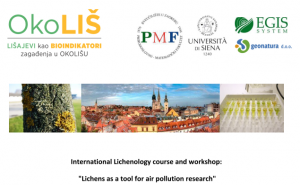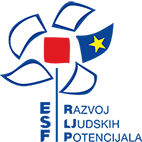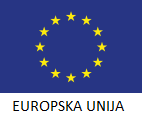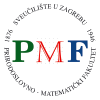International Lichenology course and workshop: “Lichens as a tool for air pollution research”
08/07/2016

The aim of the course is to provide the participants with the basic knowledge on lichen biology with
special emphasis on influence of air pollution to lichen physiology and distribution. This course will
focus on different aspects of using lichens as bioindicators and biomonitors. This is designed also as a
workshop where people can present their ideas and work. The aspiration is to gather people
interested in lichenology in order for them to exchange experiences and develop potential future
collaborations.
- Dates: 26th to 28th of September 2016
- Place: Department of Biology, Faculty of Science, University of Zagreb; Rooseveltov trg 6, 10000 Zagreb, Croatia.
- Fee: No fee.
- Working language: English
- International Experts: Luca Paoli (University of Siena, Italy; Egis System, Spin-off company of the
University of Siena), Silvana Munzi (University of Lisbon, Portugal) and Toby Spirbille (University of
Graz, Austria). - Target group: Master students, PhD students, researchers, consultants, and government
officials/museum staff with a relevant background in biology. - Number of participants: Maximum 15.
- Registration: Registration via e-mail, including a short CV, should be submitted until 1st of
September. Priority will be given to PhD students when the maximum number of participants is
exceeded by registrations. - Registration (or questions): Maja Maslać, e-mail: maja.maslachak@gmail.com, +385 91 6385 632.
- Indicative schedule:
26/09/2016
– Registration
– Introduction
– Introduction to lichen biology, biodiversity, bioaccumulation, biomonitoring
– Lunch break
– Introduction to lichen taxonomy and identification
– Special guest lecture
27/09/2016
– Lichenological excursion with application of the methods used in air pollution monitoring
– Lunch break
– Identification of the lichen samples collected in the morning
28/09/2016
– Physiological tests on the samples collected the day before (HPLC, fluorescence, pigment
content)
– Lunch break
– Using GIS in biomonitoring studies
– Course/workshop conclusionsThis is an indicative schedule, meaning it is possible that it will be adjusted according to the number
and the structure of the participants.




